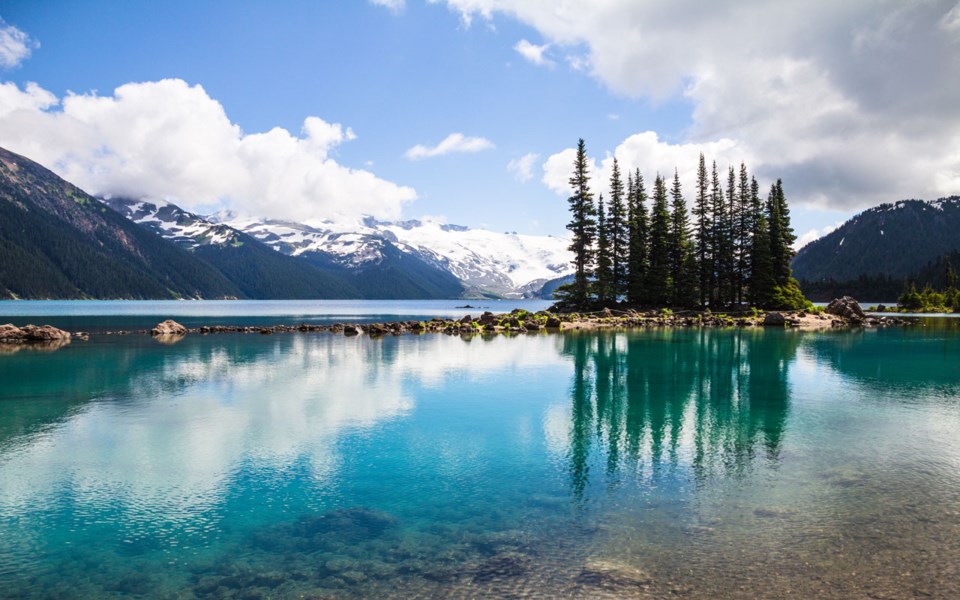Like many of us, Ben Haggar and Shawn Campbell started 2020 with ambitious goals that were halted in some way by the COVID-19 pandemic.
In the case of the local adventuring duo, they had hoped to complete 100 summits in Garibaldi Provincial Park to mark the park’s 100th anniversary.
However, an extended closure because of the health crisis set the pair behind, in no small part because the spring was set to be a prime ski mountaineering time to gain some momentum and check several trips off their list.
Campbell noted the project started out in a promising way, with the first summit coming on Round Mountain on Jan. 2 as they got some of the “low-hanging fruit,” but alpine access was hard to come by after that.
“We were able to pick it up again in February, but by early March, COVID shut us down,” he said, adding that the decision to rein the project in came before the official closure.
Haggar said that the winter presented roadblocks such as avalanche conditions within the park, leading to a slower-than-expected pace. Even the days where it was safe to go presented challenges.
“The first dozen summits, we could only see a view from the top of one or two of them. We were navigating in whiteout, basically the entire time,” Haggar said.
As conditions were starting to become more favourable, Haggar recalled, the park closed as a pandemic precaution and only reopened, with day-use passes required for entry, in late July.
“[We were] sitting there when it’s March, really good, stable conditions, the best stability, avalanche-wise, we’d had all year,” he said. “There were six or seven sunny days in a row and it was just absolute torture.”
During the year, Campbell found that some of the least technical routes have been most memorable, including Opal Cone on Mount Garibaldi. While it was lower elevation than most others they’ll target, it has great views and was a fantastic expedition with two other friends.
“It was memorable in that the company we kept was amazing and it was a slog of a day, but it was beautiful weather, we had amazing views, and it ticked all the boxes of what the project was meant to do, including exploring a new-to-us summit with great friends,” he said. “It’s a place I’ve walked by many times but had never gone to the top of.”
Once the park reopened, other factors got in the way, including work commitments, wildfire smoke, injuries and Campbell’s position as a Squamish Search and Rescue volunteer during its busiest year on record.
As such, the pair pivoted to making it a three-year project to finish the remaining summits, as Haggar has 18 and Campbell has 17. While they strive to complete nearly all summits together, the duo will occasionally go out separately.
The shift in timeline, Campbell said, resulted in a shift in thinking.
“Our objectives changed slightly in that we’re identifying some more aesthetic lines, both ascending and descending,” Campbell said. “It’s a very multisport project for us, so we’re hoping to do some more climbing, some more ski mountaineering, trail running and scrambling and incorporate some paddling and even bikes into the fray.
“It allows us the opportunity to hit certain peaks and certain objectives in the most optimal conditions.”
“This way, we’ll be able to maximize favourable conditions for travel, better conditions for summiting some key peaks, climb the route we’d like to climb as opposed to selecting the easiest way up and down, and, ideally, picking off some of the classic ski descents in the Spearhead Range,” Haggar added.
The most significant lesson they took, Campbell said, was learning to be patient and strike during safe conditions. He cited two aborted attempts of Demon Peak, once in the fall and once in the winter, as an example of how despite plenty of planning, adaptability was also required.
“We got skunked both times for various reasons but our decision making in the field was based on weather and avalanche stability,” he said. “We’re now looking at that peak as a summer objective.
“One of the biggest things was learning to be OK with being patient and just having that knowledge that the mountains aren’t going anywhere, regardless of the project.”
The duo is also pressing forward with filming the project, as Haggar is a filmmaker and photographer. He said the project was difficult to film but going forward, with less time pressure, he can linger and get shots rather than pressing on quickly.
One slight frustration, Campbell noted, was that BC Parks shifted its recognition of the 100th anniversary from 2020 to 2027. He explained that he’d had discussions with the organization leading up to the project, though in early 2020, they decided to make the change.
“The land was set aside in 1920, but the park was designated a Class A provincial park in 1927,” he said.





